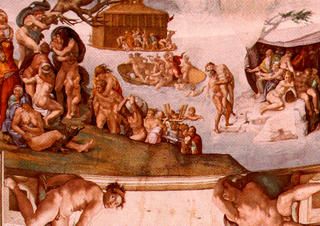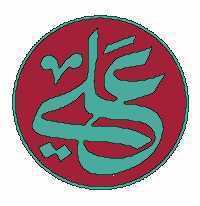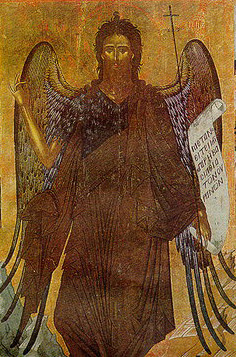السلطان "The Sultan"

١
The summit of Cairo became visible above the top of Muqattam hill like bees’ hives - houses sticking to adjoining buildings with minarets and domes poking holes between them, the late afternoon covering (the area) in a sleepy, ashen veil.
The sultan, Noah, stopped the parade’s procession and turned towards his servant Mansur, saying: “Leave me, and return a little before dawn.” Mansur didn’t leave, but instead stood speechless and confused. The sultan said (again): “Go! The appointed time of prayers is quickly approaching.”
Mansur took out an ax from underneath his cloak, on the blade of which death was shining. He threw it at the feet of the Sultan and said sadly: “I was commissioned to kill you, my lord.” The sultan stared at him in a daze, so the man continued: “It was agreed that I should hide, (waiting) until night fell and then approach you stealthily in order to remove your head.”
The sultan’s face yellowed like the rays of the setting sun with anger as he asked: “Who?”
“The queen,” (Mansur replied.)
“The devil! Did she have accomplices?”
“General Kardash . . . and Wazir ‘Uqbitu . . . “
“Oh the horror! A palace of sand and a tempest of iniquity seeks the destruction of a man whose (whole) life has been dedicated to justice!”
“Truly, greed is the livelihood and the provisions of subjects, my lord.”
The sultan turned, muttering: “I will certainly punish the criminals.”
Mansur said sadly: “You will not be able to return, my lord.”
“What did you say?” (The sultan responded.)
“Their eyes are everywhere and their daggers are unsheathed.”
“No subjects have loved another sultan the way they have loved me.”
“That’s why they have devised their scheme so that they could pretend afterwards that you had gone into occlusion. But if we return, they will discover my betrayal of them and they will descend upon us (with the fury) of demons.”
“Are we resigned to leaving my flock at their mercy?”
“Flee! . . . Disappear completely from their sight. I pretended to betray you in order to rescue you. They told me to return to bring the good news to them of your assassination and burial.”
The sultan’s face paled even more severely as he blurted out: “The queen, that viper, the foreheads which bent before me were heavily burdened with hypocrisy and deceit. The tongues with which she doubly and fervently praised (me) were soaked in poison. The body which obeys love trembles above waves of secret sinfulness. How did all of this happen behind my back?”
Mansur, suffering, said: “How my sadness grows, my lord.”
“Enough sadness, for what do I have now beside that? Nature will explode from its dark shell in a flaming fire of rage and revenge,” (the sultan responded.)
“Disappear, my lord! Go to the most remote highland (of Upper Egypt) or to the land of Syria. Here is a purse of gold.”
The sultan hesitated motionless as he changed into a phantom under the eyelashes of night. Mansur said anxiously: “You don’t have time. Flee before fate overtakes you.” The sultan moaned, saying: “Do you want me to renounce life, defenseless, to voluntarily seek death, to wander pursued, without a flock, to leave and look for a flock without a shepherd? The world is wide and full of starvation and plagues.”
٢
Sultan Noah lived on the edges of the city which were beyond the cemeteries. Only his closest associates had ever seen his face, and the few of his subjects who had witnessed him in the yearly festival parades. So he did what he could to disguise himself and he used the gold to buy grains. In this way, he spent his days bartering and he devoted his nights either to contemplating the revenge he would take on his enemies, or else he continued (to pray) the religious, devotional prayers which he so loved during the days of his kingship.
The news spread of his disappearance like the wind and was equally difficult to keep secret. Indeed, the conspirators worked to publicize it. So it spread from tongue to tongue and from quarter to quarter. Some of his business partners relayed it to him: “Have you heard what they’re saying about the disappearance of Sultan Noah? People are confused, saddened and asking questions. Some say that he used to spend the night praying on top of Muqattam hill, perhaps wild animals devoured him? Or perhaps highway robbers killed him? Perhaps he withdrew into some cave like the monks? That’s not to mention the queen’s grief or the minister and commander’s confusion! Oh, how much of that there is! If only you could see the people gathering in the streets. Oh, how painful is the mourning for the absent beloved!
Then the news announced on a front-page article and issued the proclamation: ‘The crown prince has been pronounced – a boy of six – sultan. And he had appointed Wazīr ‘Uqbitu, Vice Regent, and General Kardash, Wazīr and General.’
Noah received the news like a hammer blow to his head. He heard his death knell on every tongue. His ego evaporated into air. He became intimately associated with death while he was still alive. He was unable to defend himself against the onslaught completely. From death, (he acquired) an awareness of creation since he had died. That is to say the death which seemed at first obscure/ambiguous to him as he passed through it. Life wasn’t about a heart beating or blood flowing, but it was a meaning reflected in an awareness of humanity. Noah had died. He no longer considered revenge something laudable. Since another person had taken his place on the throne, a stranger had usurped his bed, and his citizens had been (unnecessarily) charged a tax of sadness and tears for his (loss.) He could see no meaning to his returning. He would demolish the world which was the greatest feast of his construction and his formation. And so the years passed, confirming his death, crushing his worldly life. For his own good, he traded all of his nights for devotional prayers. And he spent the whole amount. In this way, his path to the threshold of God’s (house) and His courtyard were cleared and made easily accessible.
This new information seemed to him a greenish-yellow color. The sultan was not the only person who had disappeared. See how the flavor of life changes, and its face is frowning. He was forcing what was proceeding, he was missing what should be enjoyed, he was withholding what he should spend at any price, he found too expensive what was really cheap. Social situations get worse, misfortunes are compounded, tyranny becomes more oppressive and iniquity becomes overwhelming. The people returned to recollecting their deceased sultan and appealing for the mercy of his bygone era. Noah returned to feeling life rushing through the limbs of his body as if in an image of his memory. But the flood of deliberate rumors about the sultan having afflicted (his) subjects, (all contrived) for the sake of ruining his reputation. (There were whispers,) some saying that he had been careless, others that he had (spent too much time) devoted to the habits of monks, still others that he had been a lecherous homosexual. Some even said that he had become so crazy, he told the members of his household to worship him. Most people doubted the truth of what was being said, but others believed the truth of it. And anxious confusion prevailed, draining (the people) in a trial of distress and affliction. So Noah became anxious and depressed. After having become satisfied with death, he began to feel the pain of what had been destroyed with death.
٣
In the fifteenth year of his disappearance, a friend named Talib visited him. He was panting from agitate excitement. Quickly, he threw himself on the sofa, saying: “The heart of the city is throbbing on account of the new delegation.”
So Noah asked with the tranquility which his nature had assumed after years of praying piously: “What happened to the heart of the city?”
“Haven’t you heard? Sultan Noah is not dead!”
A fresh confusion uprooted his tranquility and he muttered: “Noah’s not dead!?”
“Verily, he is alive and working amongst the people.”
“Talib, that’s impossible.”
“It’s the truth, with neither embellishment nor detraction!”
“Have you seen him yourself?”
“Of course.”
“Had you seen his image before?”
“I frequently saw him at festivals.”
“And you have found that the one you see now is the same sultan?”
“Precisely and exactly! And many others have recognized him too.”
“How mysterious and amazing!”
“The oppressed quickly rallied around him…”
“What did the young sultan Mutawakkil do?”
“A fight is flaring up between the two parties, that of Mutawakkil and that of Noah. Noah’s men continue to fight in disparate factions, but they are weakening the (young) sultan’s army.”
Noah mumbled in confusion: “A fight between the father and his son!”
“The son claims that the other is an imposter and swindler.”
But Noah knew that his adversary was his son.
Talib said excitedly: “In the path of justice, everything else becomes trivial.”
٤
The soul of Noah shook. It pulled from his life of seclusion and devotional prayers back into the vastness of the world. He heard his name repeated on the tongues of citizens. He heard voices calling him, asking him to deliver them from the injustice and iniquity which they were suffering. He was able to imagine, momentarily, that he had been resurrected, that he was alive (again,) that death had died. But quickly, he was defeated and dying again. He knew that that life belonged to another man. Maybe he was the imposter or crazy or the con-artist. So he became convinced that his death was forever interminable.
Still, Talib said to him: “Come with us to his barracks outside the Fatuh gate to swear to him (your) allegiance.”
(Noah’s) soul yearned to see him, so the two men went together into the darkness of the night until they joined a group too numerous to count. The two of them stood in the long battalions, the foremost parts of which were in front of the sultan’s tent and the furthest parts of which lay at the edge of the desert. Then he appeared before them, and (Noah) found that he resembled himself in height, although somewhat thinner in build. His eyes shown in the strong light and his features bore the mark of nobility. (Noah) bent down to kiss his hand, as he said: “We give you our allegiance again, just as we gave it to you the first time.”
The resurrected sultan said: “God confirms and supports the believers.”
“In order that victory might come from your hands,” (Sultan Noah responded.)
“Have you any previous experience in combat?”
“I was a soldier before I became a merchant.”
“Then join our forces!” (The resurrected sultan exclaimed.)
٥
Noah said to himself: ‘Truly, the man is a real sultan. There is no doubt about that. And to the degree that he is a sultan, to that degree I am dead. I destroyed myself, protecting myself from death; but he assumed a nature that was not his own, challenging death. No hope of existence will ever return to me, except (existence) under his wings. And such is the game of life and death which destroyed my life. Rather, he is the man who has devoted all his strength fighting in the way of lost justice. His face speaks with nobility and sincerity and determination. And if my intuition is sure of this fact, is it important whether he is the real sultan or not? His soul urged him to return to his hermetic isolation. But he quickly became ashamed of his weakness. So he decided to become a soldier in the sultan’s army and perform his devotional acts through jihad.
٦
The two armies eagerly rushed into the battle. And as was customary practice in those times, General Kardash proceeded to challenge the (new) sultan to fight him. Whenever a knight volunteered, (Kardash) felled him. But the (resurrected) sultan was leading most of his soldiers (by words rather than action.) So the real sultan charged into the battle. But General Kardash didn’t recognize him. The two exchanged violent blows, but Noah gained the upper hand against his adversary and threw him to the ground. He stood over his bleeding head and said: “Die you traitor! Don’t you know me yet?”
Kardash gazed at him with fading vision. His face was unable to express his shock as he murmured: “You! . . . No . . .No . . .” and his spirit departed.
The two armies were ferociously engaged, and the young sultan was leading his soldiers with a dexterity which surprised Noah. The battle continued until the sun set behind the walls (of the city) and both sides returned to their camps.
٧
On the second day, the young sultan appeared between the battalion lines seeking a duel. A knight went out to challenge him and a intense fight encircled them which Noah followed with a racing heart. He found himself longing for the safety of his son, yet he felt guilty for his longing. A heavy grief overwhelmed him. And when the young boy was victorious, Noah shut his eyes as if running from the pain of this world.
The youthful sultan continued to challenge the bravest knights and his victory was also repeated until the new sultan said to Noah: “Go out and face him! You are an experienced warrior!” Noah hesitated, sunken in his anxious agitation, so the sultan said again in a commanding tone: “Go! God will assist you.” Noah didn’t know any way out. The young sultan didn’t recognize his father, so he didn’t realize the conflicting emotions with which he was wrestling in his chest as he said to him with hatred: “You killed Kardash! You will pay the price of your crime!” The father grappled with his son and the son rushed to kill his father. But the father received his blows skillfully, deflecting them with dexterity and avoiding to injure him. But the skill of the son forced Noah into a tight corner and the son persisted, with mortal blows intended to lead to certain death. Indeed, the father didn’t know of any other way out, except an unexpected blow which tore his (son’s) sword away, leaving him defenseless. The young sultan stood waiting the final blow, but Noah hesitated, at which point voices from the new sultan’s army bellowed: “Off with his head!” But Noah was completely paralyzed. So his son’s soldiers attacked to defend their sultan and the armies again engaged in battle until sunset.
٨
Noah was summoned to meet the (new) sultan who asked him harshly: “Why didn’t you finish off our enemy and your enemy?”
Noah said apologetically: “I don’t kill defenseless men, my lord.”
(The sultan) said angrily: “Nevertheless, you squandered any justifaction when you wasted the blood of our dead men.!”
Noah did not doubt the truth of his words, and he sunk deeper into a state of sadness and distress.
٩
The two armies returned to the confrontation on the third day. By noon, the scales had tipped in favor of the new sultan. The sultan and his men met in the evening and the victorious army triumphantly entered the city where a spirit of enthusiasm and happiness greeted them. The new sultan decreed that the young sultan, the queen and the prominent men of their administration be thrown in jail. And the new sultan summoned Noah and said to him: “You also are to be placed in prison until a judge decides your fate.” Noah asked, stunned: “Don’t my actions, proven in battle, count in my favor?” “Nothing counts in your favor except your innocence,” the new sultan replied.
١٠
In this way, the prison brought together the groups, all shackled in chains. The first person to recognize Noah was his servant Mansur, who had rescued him from treason and who had become after a chamberlain as reward for that fictitious crime. He looked at his master in a daze and then shouted joyfully: “My lord!” The group surrounded him until they recognized him and immediately their muscles shivered. Mansur called to the young sultan: “This is your father, my lord, this is the true sultan of Egypt.”
Noah began to let his eyes gaze between the queen, his old agents, and his son. Then he said: “Of course I’m your father. My men and your mother betrayed me and you didn’t know.”
The young sultan muttered: “My father!?”
“Of course! I am your father, Noah, the victim of treason and treachery.”
“But why are you bound in chains like us?”
“It is a punishment for my refusal to kill you.”
The son said anxiously: “How much that (moment) confused me.”
Noah again began to scan with his eyes (the faces) of the queen and the rest of the men who had betrayed him. Then he said sarcastically: “Saver the consequences of your treason.” Then he motioned with his beard to himself as he said: “As I saver the consequences of my carelessness.”
(translation by khalil al-wafa' - not to be cited without permission.)
{excerpt from N. Mahfouz's collection of parables:}
"Satan's Preaching" - al-shaytan ya'izu





























0 Comments:
Post a Comment
<< Home